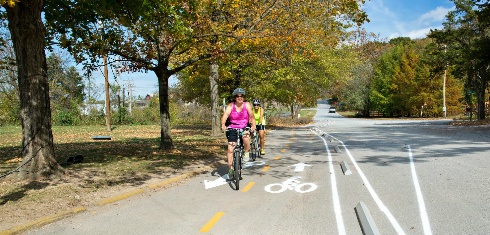Walton Family Foundation official sees ‘great opportunity’ in developing on-street cycling infrastructure
by April 5, 2018 11:16 am 1,516 views

Walton Family Foundation Home Region program director Karen Minkel says the best opportunity to strengthen Northwest Arkansas’ already growing bicycle and trail system economy lies in the further development of on-street infrastructure.
In an interview recently with the Northwest Arkansas Business Journal, Minkel discussed a number of findings from a series of studies commissioned by the foundation and released March 29, which say cycling contributed $137 million to the Northwest Arkansas economy in 2017.
Minkel said there is also an opportunity to develop the cycling economy by diversifying the users of the trail system, and said the prospects for future growth rest in part with the entire region.
“One thing about philanthropy is it doesn’t sustain these projects over time,” she said. “You really need public sector support ultimately. Philanthropy plays a wonderful role in being catalytic, but I hope this validates the decisions that have been made by leaders all across the region in terms of these investments and hopefully propels them to do more.”
In the past decade, Northwest Arkansas has grown to include 350 miles of natural-surface trails and shared-use paved paths spanning the region, according to the foundation
WFF has played a significant role in the growth. The organization’s financial support started 10 years ago with a grant to build five miles of singletrack — a type of mountain biking trail — near downtown Bentonville. Since then, the foundation has given $74 million to support the construction of 163 miles of natural-surface trails and paved paths in Northwest Arkansas. The most notable project is the $38-million Razorback Regional Greenway, a 36-mile shared-use paved trail from south Fayetteville to Bella Vista. It opened in the spring of 2015 after more than six years of construction.
Minkel said it was “heartening” to see how the region compared to other areas of the country on a per capita basis. The number of cyclists and pedestrians using the trail system over the past two years has increased to levels that continue to rival areas like San Francisco and San Diego County, when compared on a per capita basis.
She also said increasing the diversity of trail users is a priority, even though the percentage of women cycling in Northwest Arkansas (41%) is higher than the national average (37%).
“We don’t have to reinvent the wheel here,” she said. “There are a lot of groups across the country that work on getting under-represented groups cycling. The good news is there are a lot of communities we can learn from when it comes to increasing the diversity of users on the trail network.”
You can watch Minkel’s entire interview in the video below.
